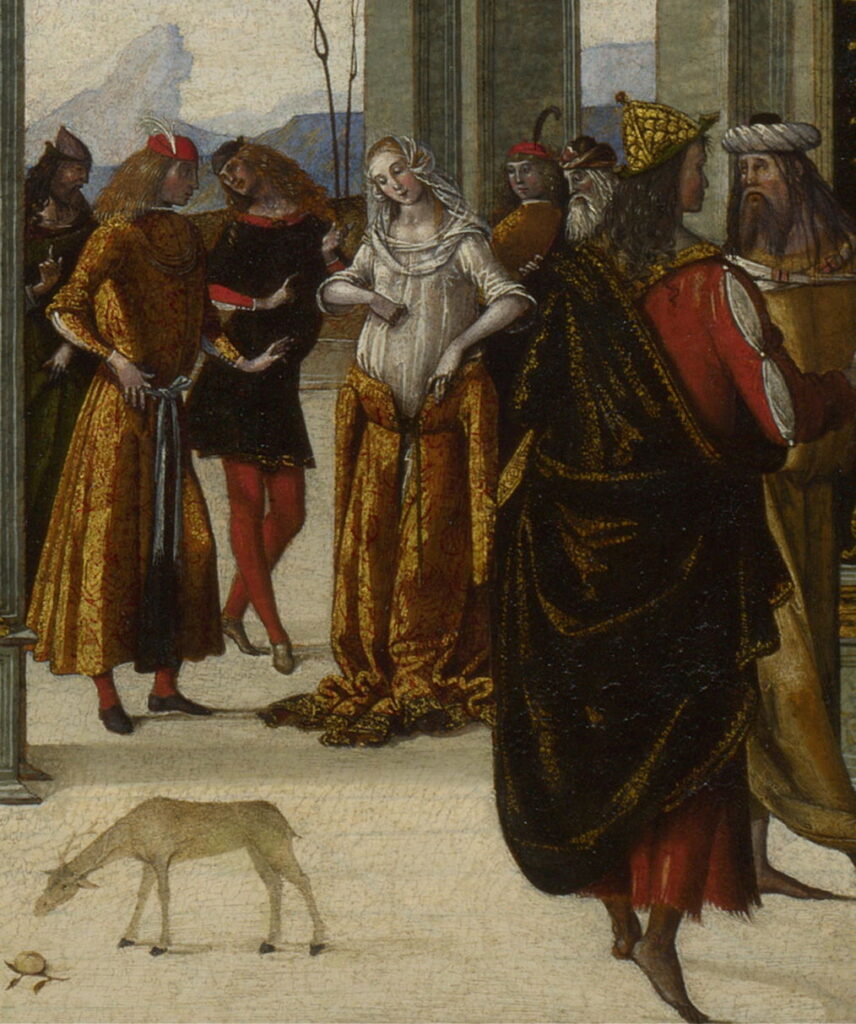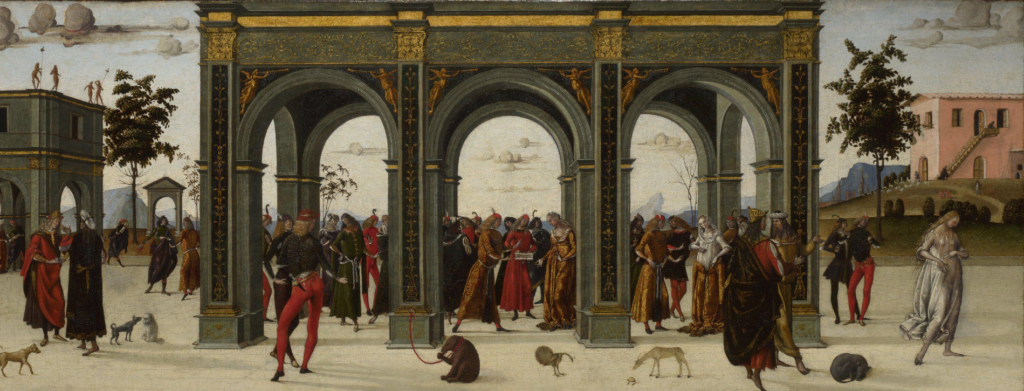Throughout the entirety of this semester, we have read several pieces of Italian literature by some well-known literary scholars/figures. We started from Dante Alighieri’s The Divine Comedy and ended on Niccolai Machiavelli’s The Prince. But the two texts that I found the most thrilling to read and that grasped my attention were Boccaccio’s The Decameron and Dante’s The Divine Comedy. During the times that both of these works were written, women had no power, rights, or say in anything socially. While men were supposed to be strong, powerful, and “manly”, women were expected to be compliant, weak, and naive. As we analyzed both texts we discovered that women were portrayed in a different light than how they were treated in those times. Boccaccio illustrated most women from his tales to have more of a say and less dependence on men. Dante had a similar approach but executed it in the way of showcasing women as important goddess-like figures.
In Boccaccio’s The Decameron, the women stated in the tales told were extremely strong. Now they were mentally strong, not the type of strength that men are usually known for. An example of this being true was on the tenth story on the tenth day, where a woman named Griselda had several “tricks” played on her by her husband that held heavy topics. One of the many tricks her husband Gualtieri played on her was when he told her that her children were sent to be killed due to the fact that she was a villager and not royal. Despite the fact that she loved her kids she agreed to have them killed, little did she know that her husband was sending them to a boarding school in Bologna. Having her go through all this emotional and mental distress from her husband and still manage to take him back, in the end, shows how strong-willed and how strong she is mental. Given the time, of course, Griselda was compliant towards all of Gualtieri’s tricks, all she wanted was for his happiness even if they got in the way or affected her own. “My lord, do with me as thou mayst deem best for thine own honor and comfort, for well I wot that I am of less account than they, and unworthy of this honorable estate to which of thy courtesy thou hast advanced me.” (029) As a result of the way women were treated in those times, she felt as though she didn’t deserve all that she received by marrying a Marquis, but is still strong enough to put up with his tricks. But this isn’t the only time that Boccacio has presented a story about a strong woman. In many stories than this one woman was at the basis of deceiving men, they were able to use their knowledge and the little power they possessed to trick men who believed they were better than them. In one instance, the second-day ninth story, Filomena told a story about a woman named Zinevra and how she was dragged up into a lie and deceived everyone into having the truth revealed. While her husband was away from Italy and in Paris with some other lads, they were all discussing how they didn’t care what their wives do when they are away because they relinquish the moment and enjoy any woman they come across. To which Bernabò, Zinevra”s husband opposed by stating that his wife would never set eyes on another man and that she was noble as a knight. Bernabò’s claim was challenged by a man named Ambrogio, so much so that they made a bet. They betted that if Ambrogiulo could sleep with Zinevra and get her intimate clothes as proof and bring it back to Paris to show her husband he had to pay him 6,000 florins. Ambrogio convinced a friend of Zinevra’s to sneak him into her room via a trunk, to which the friend agreed. At night while Zinevra was asleep he got out of the trunk, took one of Zinevra’s undergarments and examined her naked body. He went back to her husband, gave him his findings and got paid the 6000 florins. Bernabò was crushed and planned to kill Zinevra, of course, was confused. Zinevra convinces the servant sent to kill her to let her go and in return, she will keep him off the hook. She disguised herself as a cabin boy in a ship and changed her name. Once she got to Paros she heard Ambrogiulo bragging about how he “slept” with Zinevra which answered the question she thought of while pleading with the servant “ “ Mercy for God’s sake; make not thyself the murderer of one that has done thee no wrong, at the behest of another. The all-seeing God knows that I never ought to merit such a requital at my husband’s hands. But enough of this for the present: there is a way in which thou canst serve at once God and thy master and myself, if thou wilt do as I bid thee: take, then, these clothes of mine and give me in exchange just thy doublet and a hood; and carry the clothes with thee to my lord and thine, and tell him that thou hast slain me; and I swear to thee by the life which I shall have received at thy hands, that I will get me gone, and there abide whence news of me shall never reach either him or thee or these parts. ”.” (026) After hearing that she took it upon herself to try and expose Ambrogiulo of his lies. Successful in her endeavors she revealed her true identity, exposed Ambrogiulo”s lies, and had Bernabò on his knees begging her to forgive him. In this story not only do we get a story where a woman is strong/brave enough to try and convince the man who is about to take her life to spare her and was smart, independent enough to disguise herself and uncover the truth and expose Ambrogio.

In Dante, although he took a somewhat different approach in the way he decided to showcase women it overall displayed them to be somewhat praised and empowered. In the Divine Comedy, a pilgrim named Dante is taken through this journey from Inferno to Purgatorio all the way to heaven also known as Paradiso. In the beginning, when Dante the pilgrim is at the beginning of his journey near the entrance to hell (inferno) he is beyond frightened and lost. Thankfully due to the help from Beatrice, the true hero in his story, he was able to go through Inferno. Beatrice resided in Paradiso and witnessed as Dante the pilgrim’s faith was slowly slipping away so finally, she sent for Virgil to help guide Dante and protect him in his journey. “Among those was I who were in suspense, And a fair, saintly Lady called to me. In such wise, I beseech her to command me…A friend of mine, and not the friend of fortune, Upon the desert slope is so impeded. Upon his way, that he has turned through terror, And may, I fear, already be so lost, That I too late have risen to his succour, From that which I have heard of him in Heaven….Beatrice am I, who do bid thee go; I come from there, where I would fain return; Love moved me, which compelleth me to speak…‘O Lady of virtue, thou alone through whom The human race exceedeth all contained Within the heaven that has the lesser circles, So grateful unto me is thy commandment, To obey, if ’twere already done, were late; No farther need’st thou ope to me thy wish. (Inferno, canto 2) Despite her few appearances and mentionings she still remains one of the most important female figures in the entire piece of literature. If it weren’t for her sending Virgil Dante wouldn’t have made it far within Inferno. With all the horrors that inhabit the 9 rings of hell, it is less than likely that Dante wouldn’t have made it out safely and with his faith. With her stance as almost a guardian angel, she is mentioned as kind, generous and independent.
Within both Boccaccio’s Decameron and Dante’s Divine Comedy their ability to empower and illustrate women in a different light than how they were normally perceived in the 14yth century is why they remain the two most entertaining pieces of Italian literature to indulge in compared to the rest discussed in class. From the way, Boccaccio displays women’s mental and emotional strength as well as intelligence to Dante’s Beatrice demonstrating the power and independence of a woman. Both show how the women in their tales didn’t need men, and how in fact the men needed the women. Beginning with Gualtier’s desire to have a woman who was compassionate and could stand by him, to Bernabò’s mistake of almost executing his wife, to finally Dante’s need for guidance. The women in their stories not only helped and guided them but showed their independence/strength along the way.
Work cited
“DANTE ALIGHIERI THE DIVINE COMEDY HELL (Inferno) Canto 2 ENG.” Yeye Book, unknown, www.yeyebook.com/en/dante-alighieri-the-divine-comedy-hell-inferno-canto-2-eng. Accessed 14 Dec. 2021.
Alighieri, Dante. “The Divine Comedy of Dante Alighieri: Inferno” ProQuest eBook Central, 29 Feb. 1996, https://ebookcentral.proquest.com/lib/ccny-ebooks/reader.action?docID=693941
Brown Students. “Second Day – Novel IX.” Decamaron Web, Brown Students, 15 Feb. 2010, www.brown.edu/Departments/Italian_Studies/dweb/texts/DecShowText.php?lang=eng&myID=nov0209&expand=day02.
Brown Students . “Tenth Day – Novel X.” Decamaron Web, Brown Students, 15 Feb. 2010, www.brown.edu/Departments/Italian_Studies/dweb/texts/DecShowText.php?myID=nov1010&lang=eng.




